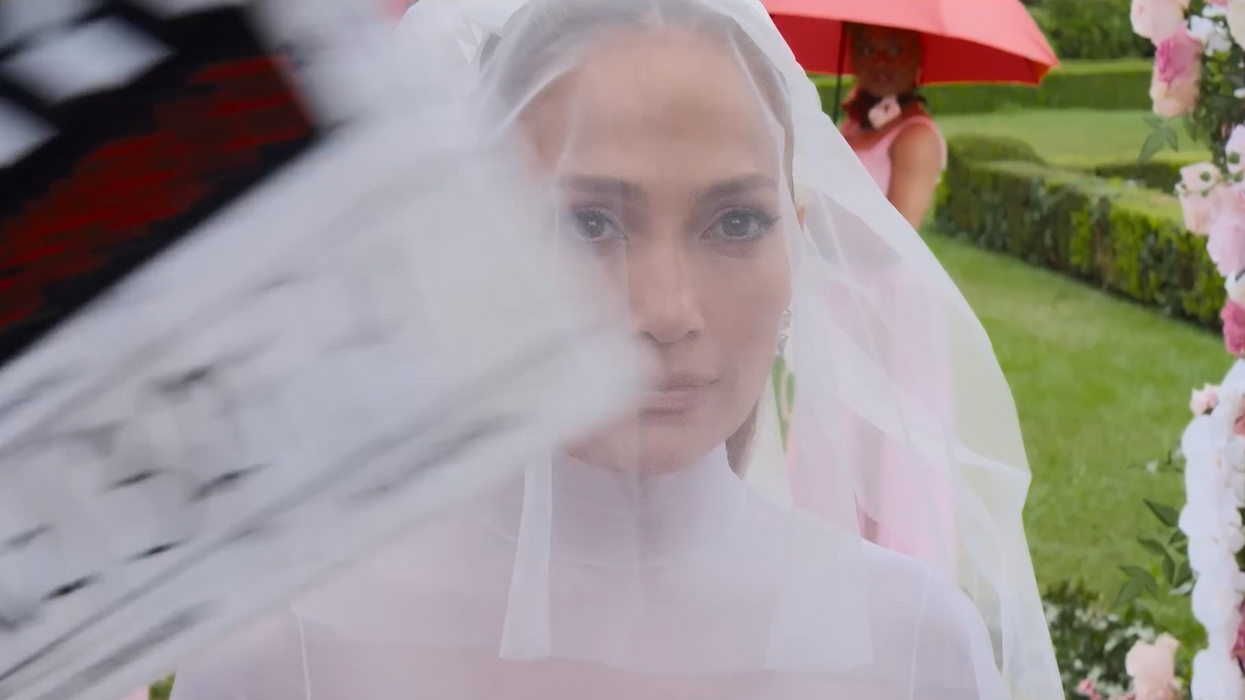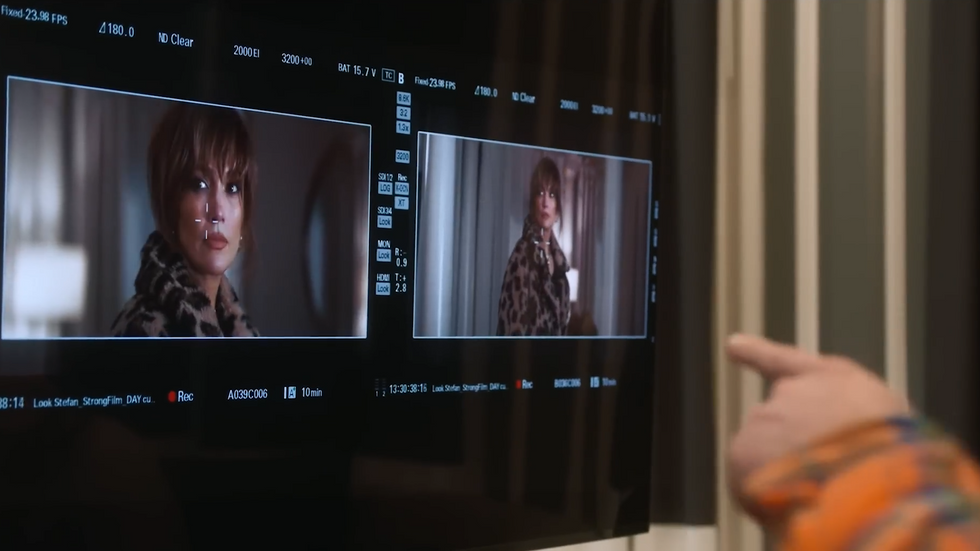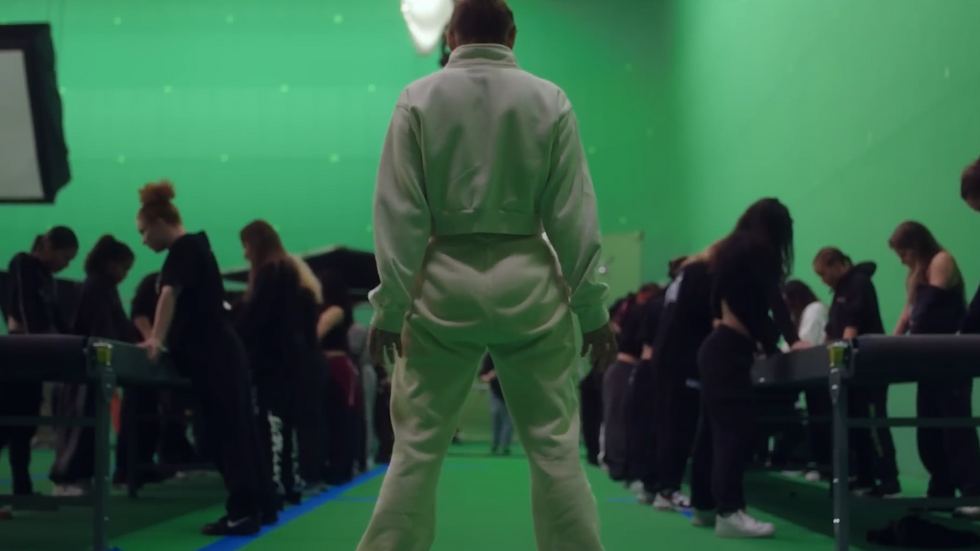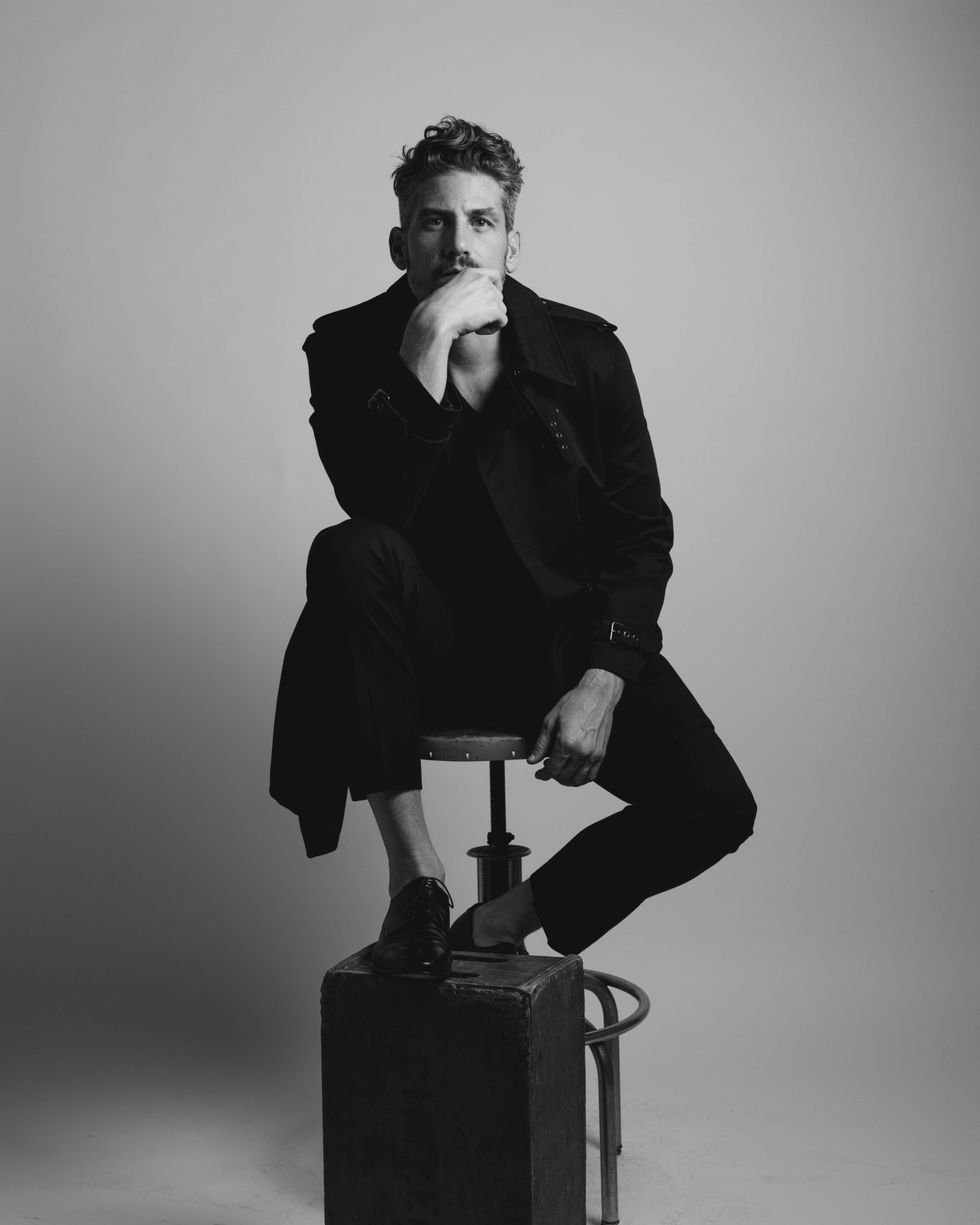How J.Lo's Documentary Captures the Heart of Filmmaking
We chat with director Jason Bergh on crafting J.Lo's touching take on her own Heart of Darknesses-esque documentary The Greatest Love Story Never Told.

Screenshot from The Greatest Love Story Never Told
If you grew up or listened to pop music anywhere within arms reach of the 90s and early aughts, you're likely to have some semblance of unavoidable knowledge of Jennifer "J.Lo" Lopez's love life. It seemed like paparazzi and tabloid culture was at an all-time high around then, and luckily (hopefully?) has calmed down at least a little bit as we've all matured in our media literacy (in some ways better than others).
As a response after a 10 year hiatus from music, J.Lo recently released her music film and album This is Me... Now . It's both an answer to that particularly public time in her very successful career and life, as well as a love letter to her voice as an artist.
The result is an hour long conceptual music video-like film cataloguing her love life and growth through good ol' visual metaphor and dance a la the likes of Lemonade (unavoidable reference, though now cliche). It's very cool and stylish and a true testament of artistic expression that's worth a watch for anyone ranging from J.Lo diehards to casual fans. I'm a punk guy with little knowledge of J.Lo past her hits, and I had fun!
But we're not here to talk about that today. While filming This is Me... Now, a separate documentary was film simultaneously of the filmmaking process of the music film, The Greatest Love Story Never Told. (Phew).
The results are a charming and vulnerable look into an already vulnerable project. For our audience here at No Film School, it also offers quite an interesting voyeuristic view on how a production of this magnitude is made (and how it might be particularly hard without the J.Lo money of it all). And, lastly, lucky for us, we got to speak with the director of the documentary Jason Bergh on the process of crafting J.Lo's Heart of Darkness.
If you're still with me after that Russian doll of an introduction, please enjoy our chat with Jason where he gives us some insight into his own musical origins, as well as the ever important advice to value your crew no matter what role they pay.
Editor's note: The following quotes are edited for length and clarity.
The Musical Origins of Jason Bergh

Screenshot from The Greatest Love Story Never Told
Amazon
"Yeah, I think for me, music is such a important part of my life.
I was lucky I had parents that played incredible music in the house and for me, introduced me to incredible music from all over the world kind of growing up. So music has always been a big part of me, and also it's a huge part of film and filmmaking and it helps set tones and evoke emotions.
And so I'm obsessed with music, and when I was younger—18, 19 years old—I was lucky enough to work for this magazine in New York called The Fridge Magazine, and we used to put on music festivals where we'd bring action sports and skateboarding festivals with musicians. We'd go up from Brooklyn to Vermont and we'd put together festivals.
And so it was very much documenting musicians. I think I shot an Eminem show, I think before even his first record came out on stage at Mount Snow in Vermont in a warehouse. So I've always just been very drawn to musicians. The process, the creativity behind it, the performance, just from writing a record to performing a record and everything in between has just been fascinating to me.
I've been shooting for, I mean, I've had a camera in my hand since I was probably 12 years old in some way, shape or form, whether it's an old Canon 81 shooting stills and developing the film. And I had a darkroom in my basement, kind of a makeshift dark room, and my dad had an enlarger from when he was younger. I remember he basically, he just kind of saw that I was interested in taking photos and telling stories and he was like, well, I think it'd be really cool for you learn how to process this film and there's so many different things and aspects that you can do when you process it—the dodging, the burning, the exposures, and all this.
I think that's where my obsession for filmmaking really begun is just understanding there's a whole process here, and that was kind of my entry into it."
The Camera Kit for 'The Greatest Love Story Never Told'
"So camera wise, for a lot of the stuff that was happening during the filming of [Jennifer Lopez's] movie, This is Me Now, we had two Sony Venices. They were rigged up on easy rigs since they get kind of heavy. And then I had the vintage Cooke S4 lenses, and we stuck a lot on, there's a lot of stuff on the 75mm, I believe the 35mm or somewhere in that 35mm range might be a 37mm for the S4s.
I love doing that. I love showing the scope of where we are and then mixing that with a closeup kind of shot so you understand the environment that you're in. And then the next shot you see is the intimate one that brings you right there. Our DP, Alex Paul, is incredible. I've worked with in the past, we talked a lot about that when we were coming up.
I wanted these big bird's eye shots, but these big bird's eye shots aren't on cranes. Literally going to the GE teams on the big movie, I'm like, 'Hey, do you guys have a ladder? Can we borrow a ladder?' They're like, 'yeah, take a ladder.' So we're grabbing ladders, running, putting them into places, and then we're climbing up on top of the ladders with a sandbag or something on top of the ladder and you got the camera on top of it and micro force zooms kind of going in.
That's tough, right? Because you got to get those shots, but you don't have a lot of time because when you're making docs, it's not like you could say, 'Hey, can you redo that?' You got to be able to be able to switch, get the micro force off and get your primes back on and be able to switch pretty fast. And that comes from the incredible assistant cameras, first acs, second acs, and third acs that were just on point. And we knew we got to switch, we're switch swinging the lens, boom, got, we already say, okay, how fast can we swing the lens?
And sometimes we'd be like, all right, this one's going to be like 45 seconds, or this one's going to be a minute and a half, or, oh, I can swing this one in 10 seconds. And then you kind of look and you're like, okay, well I can get this shot. Then you got to kind of plan, okay, if this lens is going to take this long to switch, you got to replan where you are and what you're doing based on that."
Jason Bergh on the Importance of Respecting Your Crew

Screenshot from The Greatest Love Story Never Told
Amazon
"I mean, we're nothing without crew. Crew is the heartbeat of any project that you're on. Every single person from the PA to the executive producers, everybody needs to be respected and needs to be treated the way that you would want to be treated.
I'm so lucky because we had such a wonderful family-like crew on this. I was reading a post the other day, and Natalie, one of our first acs was just like, I'm miss hearing Jason's banter on the comms because you also, when you're on the comms, sometimes it's intense and I have a tendency to just throw a joke in there or just say, how lucky are we to be doing what we're doing just to keep everyone, it gets intense when you're in these scenes and you need to break through the intensity a little bit throughout the day.
We all were PAs at some point in our careers, and PAs are the future of our business. They are there learning and trying to soak in as much knowledge as they possibly can, and they're on their way up in a business that's already tough. That's why you try to—at least for me, I try to when I'm in control—fix the things that I saw were broken when I was coming up."
The Ebb and Flow of Shooting a Doc about a Shoot
"There were tons of meetings beforehand, understanding what was happening and what was taking place as far as her making her film This Is Me... Now
We did a ton of research. We read the scripts, talked to people, and tried to figure out what was happening. Then the day before, every night, I'd reread the sides and really try to understand what was happening on that specific day. That's when I'll make the plan with the DP. We'll come in the morning and say, 'Okay, well, let's concentrate on these lenses for the day, or this is how we're going to move, or we've got rain coming today. How do we play that into the story?' We're just going with the flow.
Because again, with docs, you can't ask to do things twice, so you have to be ready and go with the flow. So yes, we do plan, but a lot of it is found during the day, and you've got to be open as a filmmaker to let things find you while you're doing what you're doing throughout the day. But you also have to search for it and look for it. I hope that makes sense. It's a combination of things.
Those are the documentaries that I love—when things happen, a phone call happens, and it changes the trajectory of your story. Then you've got to go and follow that story as it's happening. That's not scripted. You can't script that. That's just real life happening, and you have to be so aware and so in tune with what's going on that you are able to pivot.
That's the difference, I think, with docs. Things can change in a matter of a second, and if you're not prepared and always ready... Sometimes I come home at the end of the night, and I literally make it to my bed, and I'm fully clothed, and I'll just sleep. I've been thinking so hard all day and trying to be steps ahead with my preparation and how I go about it. So yeah, I hope that answers the question.
We had a fantastic editorial team led by Lindsay Utz, Grace Zahrah, Lenny Masina, Jenn Horvath, Elizabeth Maria Barrett. They are the best of the best. We basically shot everything, and yes, I don't look too much at dailies because I'm still obsessive about what I'm getting throughout the day and taking notes. I'm always taking notes throughout the day of things that stood out to me."
Jason's Advice to Future Filmmakers

Jason Bergh
"I think advice for filmmakers is always based on that specific filmmaker that asks me, just based on who they are and what they're doing and what they want to do.
But for me, and it's funny that we're on No Film School, my piece of advice is: don't go to film school and get a business degree or some sort of business degree instead, because as filmmakers, we are our own business. It doesn't matter if we work in a company, production company, or an agency.
As filmmakers, we are our own business, and we need to know how to operate our business or we get taken advantage of. You can learn film as a PA, and especially now with YouTube and all the resources out there, you can learn a lot on set. I think being a PA for a year, you can learn a lot, probably more than a year in college as far as going to film school.
Yeah, film school right now, I think you could look at the Chapmans and the NYUs—amazing institutions—but they're $90,000 a year. To me, it's like if you have someone who's going to pay $90,000 a year, I would say, well take that $90,000 and put that into a budget for a film. You can make a film for $90,000. People do it all the time."
The Greatest Love Story Never Told is now streaming on Amazon Prime.











